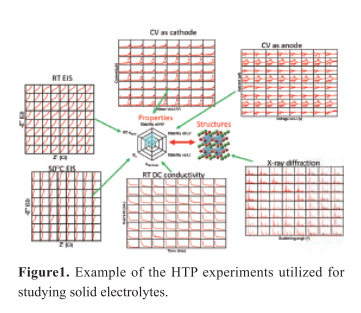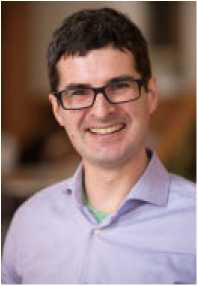Eric McCalla
1 Chemistry department, McGill University
EXTENDED ABSTRACT: Advanced battery materials fbr next-generation technologies involve complex chemistries (at least pseudo-quaternary). These materials all lie in systems where only a handful of compositions have been explored. Furthermore, in cases where further substitutions may prove useful, only a few substituents are typically considered. To fully understand the impact of composition and structure upon the battery properties, thousands of samples are required. Herein, a suite of high-throughput (HTP) methods (a total workflow of 892 samples/week) developed and utilized in the McCalla lab is presented. HTP experiments (as illustrated in Fig. 1) include X-ray diffraction, electrochemistry (to yield important metrics such as energy density, cycling stability, and electrochemical stability window), electrochemical impedance spectroscopy (to determine ionic conductivity and stability against metallic anodes), and DC conductivity measurements. These methods, all in high- throughput, permit the systematic design of cathodes, anodes and solid electrolytes fbr both Li- and Na-ion batteries. This presentation will then focus on progress made in developing various components of advanced batteries using our HTP experiments. These include high-voltage cathodes for Li-ion batteries 1, layered oxide cathodes fbr Na-ion batteries2, and ceramic oxides as solid electrolytes3-4. In each case, HTP screening of substituents (up to 52 tested simultaneously) yields materials with significantly improved properties and advances our fundamental understanding of the complex roles of substitutions in these systems.

REFERENCES
[1] A. Jonderian et al. Adv. Energy Mater. DOI: 10.1002/aenm.202201704 (2022).
⑵ S. Jia, J. Counsell, M. Adamic, A. Jonderian and E. McCalla. J. Mater. Chem. A 10, 251 (2022).
[3] N.S.M. Johari et al. J. Power Sources 541, 231706 (2022).
[4] A. Jonderian, M. Ting and E. McCalla. Chem. Mater. 33,4792 (2021).

Eric McCalla completed his PhD at Dalhousie in 2013 and a post-doc at the College-de-France in 2015, both of which focused on battery materials research. Following this, he completed a post-doc at the University of Minnesota looking at electronic and magnetic properties of complex oxides. Since 2018, he is an assistant professor in the Chemistry department at McGill University. His group focusses on developing and applying high-throughput methods to accelerate the development and understanding of advanced battery materials. He is the co¬author of 45 articles (13 as the principal investigator).